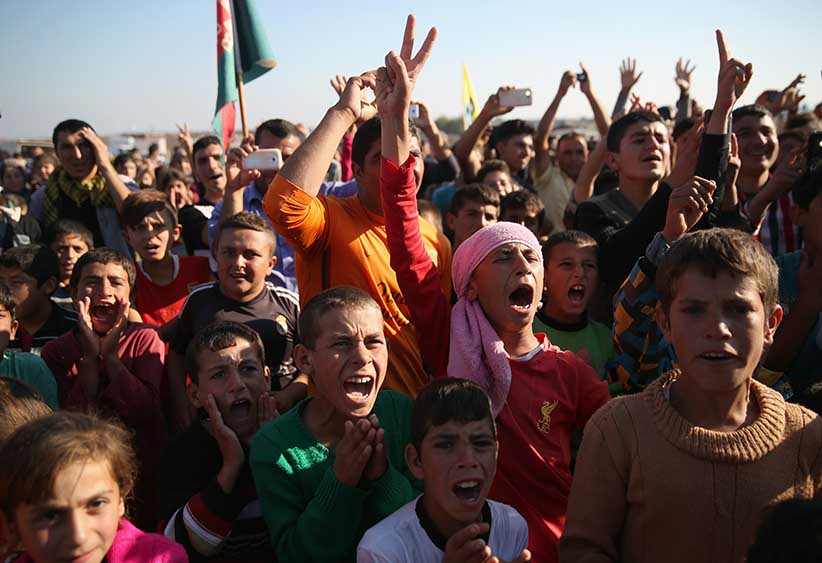Did the Liberals have to wait to call ISIS genocidal?
The author of a new book on ‘genocide’ and ‘crimes against humanity’ says the terms aren’t just technical legalese
Macleans Magazine’s Ottawa and Montreal bureau head shots at Third Floor York studio in Ottawa December 12, 2013.
Photo by Blair Gable
Share

The author of an acclaimed new book on how the terms “genocide” and “crimes against humanity” became the legal headings under which we categorize the worst outrages says the “G-word” still grabs attention, even in an era when politicians and public alike can seem inured to news of horrific violence.
That “genocide” still isn’t a word tossed around casually was clear in Ottawa this week. On Tuesday, Prime Minister Justin Trudeau’s Liberals voted down an opposition motion that would have applied the label to the aims and actions of the so-called Islamic State. “We feel that determinations of genocide need to be done by objective measures and through proper research on the international stage,” Trudeau explained.
But today, after a United Nations report said the terrorist group is committing genocide against the minority Yazidis, Foreign Minister Stéphane Dion relented. “For the first time, an independent study by the UN has concluded that genocide was committed by the so-called Islamic State against the Yazidis,” Dion said. “Given this evidence, our government believes that genocide against the Yazidis is currently ongoing.”
In a phone interview, Philippe Sands, a law professor at University College London, and author of East West Street: On the Origins of ‘Genocide’ and ‘Crimes Against Humanity’, called it “ridiculous” for politicians to shy from using the word genocide while waiting for some formal determination to be made. Sands pointed out that the British government has also been hesitant to call ISIS genocidal as a matter of political judgement.
“I think what a prime minister can say is, “Ultimately, it’s for courts to decide whether the elements of a crime have been met to characterize it as a genocide, but on the basis of the information before me, I can say that these acts of killing and horror appear to be motivated by a genocidal intent,’ ” Sands said.
There is a deeper question, though, about why applying that word to ISIS seems to matter so much. Sands noted that U.S. Secretary of State John Kerry drew wide attention back in March by calling ISIS atrocities against minorities genocide. “If Kerry had said, ‘Crimes against humanity and war crimes are being committed in northern Iraq,’ it would have been on Page 14 of the newspapers,” he said. “Because he used the G-word, it’s on Page 1.”
Sands added he doubts Kerry’s pronouncement followed any technical determination by the U.S. government. “In other words, it doesn’t have any consequences in legal terms,” he said. “But it was motivated by a political reality, that what was happening had crossed a threshold.”
The precise threshold, however, is not always easy to define. The UN’s 1948 Convention on the Prevention and Punishment of the Crime of Genocide lists a range of acts—from killing to injuring to forcibly taking away children—done with the “intent to destroy, in whole or in part, a national, ethnical, racial or religious group.” We have come to think of genocide, however, mainly in terms of the numbers killed, rather than the intent of the killers.
Yet Sands said the man who coined the term genocide, Raphael Lemkin—a Polish-born Jewish lawyer who moved to the U.S. as a refugee in 1941—would have seen, for instance, the killing of 13 people for their ethnicity from a village of 50 as an instance of genocide. Sands would prefer a return to Lemkin’s idea, which has taken on new urgency ever since the UN’s creation in the 1990s of criminal tribunals to try those accused of horrific violence in Rwanda and the former Yugoslavia.
It is now regarded as “the crime of crimes,” Sands said, and that makes it particularly important for those seeking justice. “If the indictment and conviction is not genocide, victims tend to feel aggrieved—that the horrors they have been subjected to are somehow less terrible,” he said.
In East West Street, Sands tells the story of how Lemkin originated the concept of genocide, while Hersch Lauterpacht did the same for crimes against humanity. He discovered that Lemkin and Lauterpacht had both studied law at Lviv University, only a few years apart, in what is now Ukraine (in the same city where Sands’ family has roots, which adds a dimension that book reviewers have found fascinating).
But these two crucial concepts—both incorporated into humanitarian law in the 1940s—are in a sense counterbalanced. “The essential difference,” Sands said, “is that crime against humanity is concerned with protection of individuals and genocide is concerned with the protection of groups.”
And so, as far as proving genocide goes, the problem is finding hard evidence that the aim of the violence went beyond the victims as individuals, that it was meant to destroy, in whole or in part, a distinct group. “Perpetrators tend not to say that, to leave pieces of paper lying around saying that, tend not to give press interviews saying that’s what they are doing,” Sands said.
But compiling and sifting evidence of that sort should be the concern of lawyers and judges. Elected leaders are free to wield the word genocide, as a matter of political judgement, when they decide no other is sufficient.